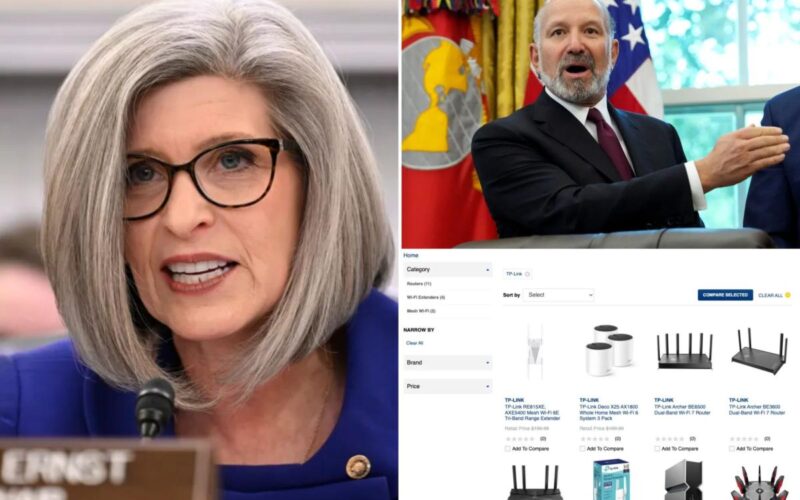WASHINGTON — Lawmakers are warning of risks from Chinese Communist Party-linked networking and smart home products that are quietly being sold at Army, Air Force, and Navy exchanges — online military stores.
Fearing Chinese infiltration, 23 lawmakers from both chambers of Congress are pushing the Trump administration to investigate and consider banning products sold by TP-Link Technologies Co. and its affiliates sold throughout the entire US.
“Open-source information indicates that TP-Link represents a serious and present danger to U.S. ICTS [Information and communications technology] security,” the group of 23 lawmakers led by Sen. Joni Ernst (R-Iowa) wrote in a letter to Commerce Secretary Howard Lutnick Thursday.
“Right now, nothing stops CCP-tied companies from spying on Americans through internet-connected cameras in our homes,” they later added. “The Chinese Communist Party can capture and exploit these videos to track, blackmail, or extort U.S. citizens—including top government and military officials.”
Of particular concern to the bipartisan group is the TP-Link cameras being sold in the US. While they appear to be out of stock on the websites for the Army, Air Force, and Navy exchanges, lawmakers fear they are gaining popularity in the US.
Exchanges are limited to active-duty personnel, military families, students at military schools, Department of War employees and veterans.
“China will use any way to infiltrate us, and we must ensure they cannot access our homeland or military bases,” Ernst told The Post.
“We have seen this playbook from China before, with Huawei Technologies, and need the Trump administration to investigate and determine if TP-Link is a trojan horse compromising our national security.”
TP-Link, a popular brand that sells products such as Wi-Fi routers, smart cameras, baby monitors, smart plugs, and more, is headquartered in Shenzhen, China, though it does have a smaller HQ in Irvine, California.
China has enacted multiple laws, including the National Intelligence Law of 2017, requiring “any organization or citizen [to] support, assist and cooperate with state intelligence work.”
That law also requires firms to tack backdoors — secret portals that China can exploit to gain access — into key software and equipment, as the Department of Homeland Security noted in a report. Beijing has also tightened those policies in the years since, with the 2017 Cybersecurity Law and 2021 Data Security Law.
Lawmakers and China buffs alike have raised alarms about TP-Link for years. Last year, for example, the heads of the House Select China Committee similarly urged the Commerce Department to probe the tech company.
“Congress has discovered that TP-Link — a company with clear ties to Communist China, whose products are used by the U.S. military and sold on Amazon — is inserting CCP-controlled technology into Americans’ homes while undercutting our supply chains,” Rep. Ashley Hinson (R-Iowa), who also signed the letter, told The Post.
“This is yet another backdoor for the CCP to track or exploit Americans — and closing it should be a no-brainer in an era when cyberwarfare defines the threats we face.”
The Post reached out to the Department of Commerce for comment.
Despite those concerns, TP-Link router products are being sold on the US Navy Exchange as well as the US Air Force and Army Exchange.
Moreover, four years ago, the Department of War gave a contractor a $174,195 award for a contract whose description simply read “TP-Link.” The company has been included in several other government contracts as well.
During his first administration, President Trump’s administration barred Huawei Technologies from US telecom networks due to national security concerns.
TP-Link products are popular among top retailers, including Walmart and Amazon. Some of its products, such as Wi-Fi extenders and routers, are listed as best-sellers on Amazon.
A TP-Link Systems Inc. spokesperson vehemently denied those concerns, telling The Post that the company only has about 3% of the US security camera market and underscored that the company “has located its core security functions and data infrastructure in the United States.”
“TP-Link products do not present national security risks to the United States,” the spokesperson argued. “TP-Link emphatically objects to any allegation it is tied to the Communist Party of China, dependent on the Chinese government, or otherwise subject to interference under Chinese national security laws.
“Neither the Chinese government nor the CCP exercises any form of ownership or control over TP-Link, its products, or its user data. TP-Link’s founder and CEO, Jeffrey Chao, resides in Irvine, CA, and is not and never has been a member of the CCP.”
The spokesperson also said that US data is stashed on “Amazon Web Services infrastructure in Virginia.”
“TP-Link does not enable foreign surveillance of U.S. networks or users,” the spokesperson added. “The company’s operations are built to prevent potential attempts to subvert its business by outside influence.”
The bipartisan group is urging the Commerce Department to “evaluate the national security risks” posed by TP-Link and assess its regulatory abilities to address that threat.
They gave a deadline of Nov. 30 for the Commerce Department to complete that assessment.








